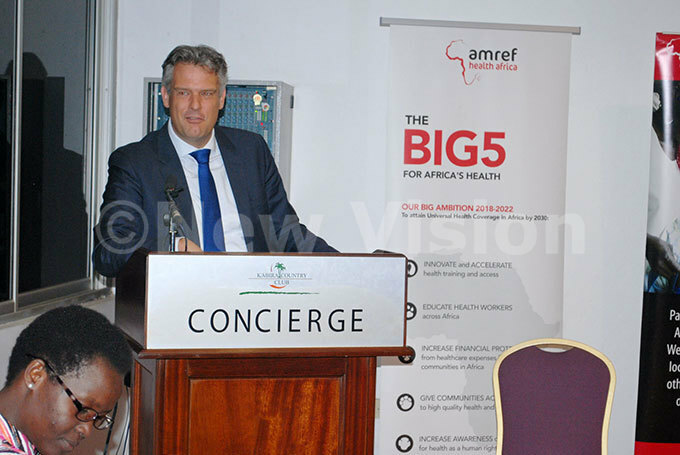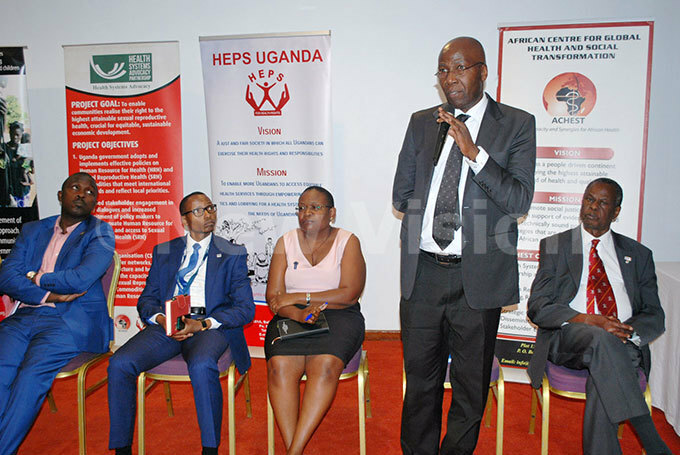Youth petition govt on sexual and reproductive health issues
The dialogue attracted youths from districts of Kabale, Soroti, Kisoro, Serere and Dokolo.
REPRODUCTIVE HEALTH
Youth have petitioned government to publish the adolescent client's charter and make it accessible in 53 gazetted languages spoken in Uganda.
The charter specifies that adolescents have demarcated spaces to access information on sexual and reproductive health from the right people and to protect it .
The same charter includes the kind of care young people need, be treated with dignity and respect and give feedback about health services among others.
Presenting the petition, Catherine Kyomuhendo who is the chairman youth Kabale urged government to improve access to life skills/ sexuality education, youth friendly health services and provide appropriate training for the service providers handling adolescents.
 Deputy Head of mission cooperation at the Netherlands Embassy, Joris; Van-Bommel (Photo by Agnes Kyotalengerire)
Deputy Head of mission cooperation at the Netherlands Embassy, Joris; Van-Bommel (Photo by Agnes Kyotalengerire)
This was during an intergenerational dialogue organised by Amref Health Africa-Uganda at Kabira Country club on Monday.
The dialogue attracted youths from districts of Kabale, Soroti, Kisoro, Serere and Dokolo. Other participants were: members of Parliament (Mps), health workers, development partners, civil society organizations and Ministry of Health officials.
Amref Health Africa Head of programmes, Dr. Patrick Kagurusi said the dialogue was mainly to enable the participants to interact and share needs to the productive need of young people.
The Deputy Head of Mission/Cooperation at the Netherlands Embassy Joris; Van Bommel commended the organisers because the dialogue addressed patent sexual reproductive health issues concerning the youth since they are the future.
Bommel said his government will increase support to Uganda on sexual and reproductive health services.
The youth also demanded for their participation in policy making processes up to the grass root as the urban and rural youth seem to have different perceptions regarding sexual reproductive health and rights services.
In addition, they called for equal and quality services of sexual reproductive health for youth living with disabilities.
"It is so hard for PWDs to access family planning commodities and information in health facilities. Often, health workers have negative attitude towards us when we go to seek health services.
For instance, they put a pregnant person to explain why she chose so and who is responsible" Victoria Nalule who the executive director of Tunaweza Foundation, a non-governmental organization that empowers young people with disabilities.
Additionally, Dr. Kagurusi noted with concern that most of the time when young people go for SRH services in health facilities they are turned away this is because some of the health workers do not have the skills to handle the youth.
The 2016 Uganda Health Demographic and Health Survey indicate that teenage pregnancy stands at 25% and it is considered as one of the highest in Africa. This means that one in every four girls aged 15-19 years in Uganda is pregnant or already given birth.
 Dr.livingstone Makanga addressing participants. (Photo by Agnes Kyotalengerire)
Dr.livingstone Makanga addressing participants. (Photo by Agnes Kyotalengerire)
Highlighting the need for adolescents and youth to access sexual and reproductive health commodities, Dr. Livingstone Makanga who is the principle medical officer, reproductive health division at the Ministry of Health estimated that at least 23% of adolescents are sexually active by 15years. 13% of 15-19 years old, reportedly engage in cross generational sex.
Data from the situation of Sexual Reproductive Health Rights (SRHR) in Uganda report estimates the contraceptive prevalence rate among adolescents aged 15-19 years to be at 11%.
Dr. Makanga said lack of contraceptive uptake among adolescents has contributed to about 28% deaths among adolescents due to pregnancy related conditions.
The 2016 Uganda Health Demographic and Health Survey showed that the number of mothers who die in Uganda while giving birth reduced to 368 deaths per 100, 000 live births.
The chairperson Parliamentary health committee, Dr. Micheal Bukenya pledged to follow up on sexual and reproductive health policy to ensure it is approved and disseminated.